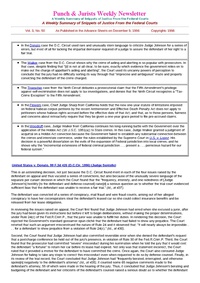This is an astonishing decision, not just because the D.C. Circuit found merit in each of the four issues raised by the defendant on appeal and thus vacated a series of convictions, but also because of the unusually severe language of the separate per curiam decision in which the …
Here, after a detailed explanation of the differences between "actual" and "implied" juror bias, the Court held that rape victims are not incapable as a matter of law of being impartial jurors in rape trials.
In responding to the two-part test established by the Supreme Court in McDonough …
Court held that a prisoner who challenges his conviction in light of the new standards articulated in Bailey is not entitled to a Certificate of Appealability.
Although the court held that the defendant could not be sentenced as an armed career criminal because his civil rights had been substantially restored, he could be convicted as a felon in possession since he was still precluded from serving on juries.
The Court cited, as the seminal …
The defendant in this case was accused of not having filed tax returns for several years. When the IRS issued a summons requiring him to testify and produce documents, he asserted his Fifth Amendment privilege against self-incrimination. The Government asserted that he had no such privilege in a tax …
Although the defendant lost this appeal, he raised some of the most creative arguments we have seen challenging the constitutionality of 18 U.S.C. § 922(g)(1). That statute prohibits any person who has been convicted of a crime punishable by imprisonment for a term exceeding one year from possessing a …
Guilty by inference! This case deals with two Guideline sentencing enhancements - victim vulnerability under U.S.S.G. § 3A1.1(b) and abuse of position of trust under U.S.S.G. § 3B1.3. The defendant, who falsely presented himself as a psychologist for mental health patients, was convicted of a number of crimes including …
Here the Court rejected Government's contention that there is a "tax crime exception" to the Fifth Amendment's self-incrimination clause under which the privilege against self-incrimination would not apply to tax investigations.
The defendant in this case was accused of not having filed tax returns for several years. When …
This is an astonishing decision, not just because the D.C. Circuit found merit in each of the four issues raised by the defendant on appeal and thus vacated a series of convictions, but also because of the unusually severe language of the separate per curiam decision in which the …
This is an extremely important decision that deals with the effective date of the new one-year statute of limitations that was imposed on Federal habeas corpus petitions by the recent Antiterrorism and Effective Death Penalty Act ("AEDPA"). That Act, which was signed into law on April 24, 1996, specifies …
This is an astonishing decision, not just because the D.C. Circuit found merit in each of the four issues raised by the defendant on appeal and thus vacated a series of convictions, but also because of the unusually severe language of the separate per curiam decision in which the …
One of the issues presented in this appeal was a sentencing enhancement for victim vulnerability under U.S.S.G. § 3A1.1(b). The defendant, who falsely presented himself as a psychologist for mental health patients, was convicted of a number of crimes including mail and wire fraud and the making of false …
Despite reasoning that it was not clear what evidence the Government relied upon to make the charge of aiding and abetting, the Court affirmed a conviction on the grounds that the jury could have found an adequate basis for that charge.
Second only to conspiracy, the crime of …
Here the Court granted habeas relief in a case where the defendant was sentenced to 20 years, after rejecting a plea offer that would have given him 1 to 3 years, because counsel never advised him as to the wisdom of his decision.
In this case the Second …
Here the Courtt held that the district court erred when it excused a juror, after the jury had been given its instructions but before it left to begin deliberations, without making the proper determinations, under Rule 24(c) of the Fed.R.Crim.P.
This is an astonishing decision, not just because …
Here the Court refused to issue a Certificate of Appealability to a post-Bailey petitioner because "[he was] not making a constitutional claim. He [was] making a claim to a federal statutory right. Bailey did no more than interpret a statute, and an incorrect application of a statute by a …
This case, which is long from over, has sent tremors of fear through the Government. The defendant was charged with robbing three jewelry stores and attempting to rob a fourth. Initially, Judge Walker dismissed the indictment, which charged violations of the Hobbs Act (18 U.S.C. § 1951(a)), for the …
